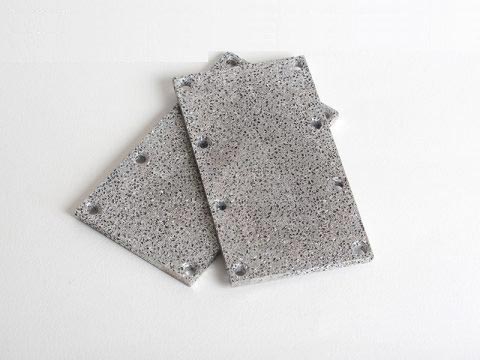Porous aluminum
Porous aluminum is a new type of aluminum matrix composite with a large amount of structure and controllable pore distribution in the aluminum or aluminum alloy framework. According to its structural characteristics, it can be divided into closed - cell foam and open cell foam. Closed pore refers to the independent and self-closing of the cell pore and its adjacent pore, while open pore is connected with each other. It is generally believed that the through-hole is a porous material, while the closed cell is cellular material, and porous aluminum is the general name of the two materials. Porous aluminum is commonly used for its light weight, high specific strength, excellent physical properties and versatile compatibility.
Features of porous aluminum:
Application: Porous aluminum foam has the characteristics of structural materials and functional materials. As a structural material, it has the characteristics of light weight and high specific strength; as a functional material, it also has many physical properties such as sound absorption, sound insulation, heat insulation, flame retardant, shock absorption, damping, shock absorption skills, electromagnetic shielding and so on. Therefore, it is widely used in environmental protection, energy, machinery, chemical industry, aerospace, transportation and other fields.
Porous aluminum is a new type of aluminum matrix composite with a large amount of structure and controllable pore distribution in the aluminum or aluminum alloy framework. According to its structural characteristics, it can be divided into closed - cell foam and open cell foam. Closed pore refers to the independent and self-closing of the cell pore and its adjacent pore, while open pore is connected with each other. It is generally believed that the through-hole is a porous material, while the closed cell is cellular material, and porous aluminum is the general name of the two materials. Porous aluminum is commonly used for its light weight, high specific strength, excellent physical properties and versatile compatibility.
Features of porous aluminum:
| Structural characteristics of porous aluminum | Pore structure | The main characteristic of porous aluminum is a large number of holes. Pore size and porosity are the basic parameters of porous aluminum. The pore size is usually 0.5-5.0mm and the porosity is 40%--90%. The density of foam aluminum can be varied in a wide range. The density is usually 0.18--0.48 g/mm3, which is about 1/10 of aluminum density, 1/20 of titanium density, 1/30 of steel density, and 1/3. of wood density. The maximum porosity of porous aluminum can reach 97% at present, and the pore size is from several microns to tens of microns. The general rule is that the greater the porosity, the smaller the density of porous aluminum. The density of porous aluminum is only 0.1--0.6 times that of the parent metal. It is a lightweight functional material. |
| specific surface area | The specific surface area of porous materials, the ratio of the surface area to the volume of a porous material with a certain volume, has a large specific surface area, which is another characteristic of porous aluminum. The surface area of 10--40cm2/cm3. foam usually increases with the increase of porosity and density. | |
| Performance characteristics of porous aluminum | High Damping Performance | Porous aluminum is made of metal skeleton and voids, and its micro structure is very uneven. It is not as directional as honeycomb material, nor has the rebound effect of polymer foam material. In the process of loading, there is a long stationary section in the compressive stress-strain curve, that is, the strain lags behind the stress strongly, so it is a kind of damping alloy. It is a good material for making impact resistant parts. Moreover, the damping capacity of porous aluminum is related to the pore size of the foam. The damping capacity of the porous aluminum can be adjusted by adjusting the void characteristics of the material. |
| Special Acoustic Performance | Porous aluminum has a large number of holes allowing sound waves to enter. The medium in the foam (generally air) is compressed and stretched under the action of sound waves, causing friction between the medium and the wall of the hole, making the sound energy change into heat energy. The medium in the bubble vibrates under the sound wave, causing the sound wave to shoot on the metal surface, resulting in diffuse interference and silencing. Therefore, porous aluminum has attractive and silencing effects. The pore size of porous aluminum affects the absorption performance of the whole frequency range. The smaller the hole, the greater the sound absorption ability. In general, sound absorption properties can be obtained by changing the size and shape of the porous aluminum hole. Generally speaking, the sound absorption property of through foam aluminum is better. | |
| Excellent Fluid Passing Property | The porous aluminum foam with good permeability can be used as filtering material to remove solid particles from liquid or gas. Usually, the permeability increases with the increase of aperture, but it is also affected by surface roughness and the number of closed holes. Porous aluminum foam is suitable for all kinds of solid-liquid, solid gas, liquid liquid separation and controlled flow. It can be used for all kinds of liquid, gas filters and high temperature dust remover. | |
| Excellent Surface Exchange Capability | The large surface area of porous foam aluminum greatly improves the contact area between the fluid and the material surface. Using the large surface area of porous foam aluminum, the material and energy exchange can be realized when the fluid passes through. Therefore, porous foam aluminum can be used as a good material for making heaters and heat exchangers, and can also be used as carriers for large surface chemical tombs. For example, as the carrier of catalyst, porous electrode, plate material of rechargeable battery, heat exchanger, energy absorber and catalyst carrier, etc. |
Application: Porous aluminum foam has the characteristics of structural materials and functional materials. As a structural material, it has the characteristics of light weight and high specific strength; as a functional material, it also has many physical properties such as sound absorption, sound insulation, heat insulation, flame retardant, shock absorption, damping, shock absorption skills, electromagnetic shielding and so on. Therefore, it is widely used in environmental protection, energy, machinery, chemical industry, aerospace, transportation and other fields.











